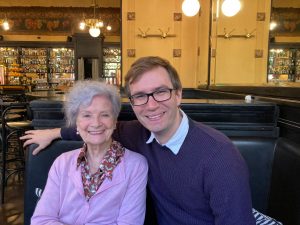I’ve been working on radio culture for a while now, and it’s still a surprise to me how often this most immaterial of media feels most resonant – most cutting edge – in the paper trail it’s left behind. Ester wrote in our inaugural blog post about the BBC Written Archives Centre (WAC), a veritable treasure trove of documents, and it’s in this archive that the story I’ll begin to tell today began.
You don’t always find what you thought you would in the WAC. Some paper trails lead nowhere. It was on one of those days – leafing through files, failing to see anything of immediate interest – that I came across a name I didn’t know: Ariella Reggio. Reggio, I soon gathered, had contributed to a number of long-running series back in the 1960s, each of them expressly designed to improve listeners’ language skills. Italian for Beginners. Keep Up Your Italian. Use Your Italian. Not an inconsiderable CV, I thought. Yet the surviving files seemed a bit thin – nothing but memos about recording dates and labour permit extensions – and what in any case could such programmes have to tell us about Anglo-Italian relations? A little, probably, but not a lot.

Ariella Reggio has since put me right on this. Sixty years on, she’s living and working in Trieste, that fabulous city on the Italian-Slovenian border, best-known still among English speakers for hosting the likes of Joyce and Freud back in the day. Ariella, in fact, is one of several ‘donne di frontiera’ who should prompt us to think again about the place. In the course of conversation last week (thank you to Alexandros Delithanassis and the Antico Caffè San Marco – pictured here – for giving us the perfect place to chat), Ariella began to tell me about life in her hometown, from her early days at Radio Trieste to the theatre scene in which she still plays a vital part.
She also has a vital part to play, I believe, in any telling of the BBC’s story after the war. The details of her contribution to language programming in the 1960s are going to be tricky to recover, but I already know enough to know that her influence on listeners was deep and long-lasting. Not only did she teach them how to speak Italian; she was also responsible for introducing to an increasingly mobile middle class the ways of Italian culture, by voicing-up scenarios and stories, poetry and drama.

I can’t do justice to Ariella’s story in a single blog post. And I’m aware I’ve begun to smooth out some of the crinkles that make it such a compelling one. (To have singularised ‘Italian’ in the previous paragraph is, I know, to perpetuate the myth that there is only one kind! I’ll be posting in future about the Triestine dialect, of which Ariella is a vocal advocate.) For the moment, let me simply record how pleased I am to have met her. It’s not often in my line of work that you get to talk to the subject of your research, to say nothing of talking to one whose memories of an institution like the BBC, or of sixties London, or indeed of the railway journey from Trieste to London and back again, are so vivid. While I’m living in Padua, I have a rare opportunity to do so.